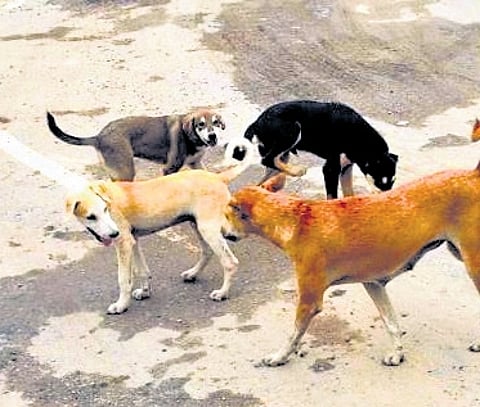

THIRUVANANTHAPURAM: Administering the rabies vaccine before a dog bite may seem unusual to many parents. However, a rise in rabies infections among children has prompted health experts to recommend pre-exposure prophylaxis (PrEP) for all children under the age of 14 before any animal attack occurs. The Indian Academy of Pediatrics (IAP) and the Kerala Government Medical Officers Association (KGMOA) have jointly called for the inclusion of PrEP in child healthcare protocols.
Providing general immunity against rabies not only helps prevent deaths but also reduces the need for expensive rabies immunoglobulin (RIG), which is administered in addition to the standard post-bite vaccine. While previously seen as an excessive measure, the surge in rabies cases and the high cost of post-exposure treatment have made PrEP a necessary intervention.
Dog bite cases in Kerala have seen a dramatic rise - from 60,000 in 2013 to over 3.16 lakh in 2024. Human fatalities have also increased, with 14 rabies deaths reported so far this year, and an annual toll of 20-25 deaths in recent years. Children remain the most affected. Globally, rabies claims around 59,000 lives annually, with 18,000-20,000 of those in India. Of these, nearly 40% are children.
“Children are most vulnerable. Many have died even after receiving the vaccine post-bite due to the challenging nature of the bites,” said Dr Riaz I, president of the IAP Kerala Chapter. “We recommend PrEP for school-going children to prevent such tragedies.” Dr Riaz also pointed out the difficulty of administering rabies serum in sensitive bite locations like eyes, underlining the advantage of pre-exposure vaccination.
The KGMOA has urged the state to form a task force to implement a universal PrEP programme, starting with children.
“Over 35% of dog bite victims are children. We must prioritise them,” said Dr Sunil P K, KGMOA president.
Both the World Health Organization (WHO) and the US Centers for Disease Control and Prevention (CDC) support pre-exposure prophylaxis for rabies. According to their guidelines, vaccinated individuals need only two booster doses after a dog bite, eliminating the need for costly serum treatment.
Dr Purushothaman Kuzhikkathukandiyil, professor of pediatrics at MES Medical College, Malappuram, emphasised the importance of targeting high-risk groups. “School-based vaccination camps should be organised, and IAP should lead training for health workers in administering intradermal rabies vaccination (IDRV),” he said.
While PrEP is mentioned in Kerala’s vaccination policy, a final decision is pending due to practical concerns. Dr Amar Fettle, the state’s nodal officer for adolescent health, said rabies is yet to be recognised as a widespread public health threat warranting mass rollout.
Dr Riaz clarified that the goal isn’t universal vaccination for all children but rather making parents aware that the option exists.
Though the National Immunization Technical Advisory Group (NITAG) hasn’t yet included rabies vaccine in the universal immunisation programme, experts say states can act independently, as Kerala did with the Rubella vaccine in 2012 and the Measles campaign in 2017.